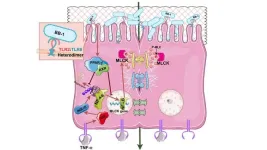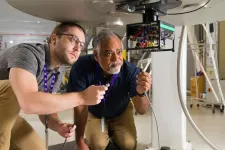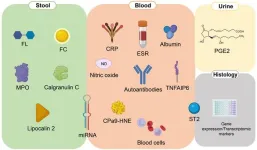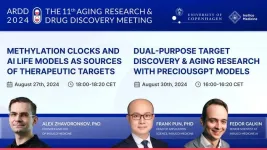(Press-News.org) August 22, 2024 — The groundbreaking ChatGPT chatbot shows potential as a time-saving tool for responding to patient questions sent to the urologist's office, suggests a study in the September issue of Urology Practice®, an Official Journal of the American Urological Association (AUA). The journal is published in the Lippincott portfolio by Wolters Kluwer.
The artificial intelligence (AI) tool generated "acceptable" responses to nearly one-half of a sample of real-life patient questions, according to the new research by Michael Scott, MD, a urologist at Stanford University School of Medicine. "Generative AI technologies may play a valuable role in providing prompt, accurate responses to routine patient questions – potentially alleviating patients' concerns while freeing up clinic time and resources to address other complex tasks," Dr. Scott comments.
Can ChatGPT accurately answer questions from urology patients?
ChatGPT is an innovative large language model (LLM) that has sparked interest across a wide range of settings, including health and medicine. In some recent studies, ChatGPT has performed well in responding to various types of medical questions, although its performance in urology is less well-established.
Modern electronic health record (EHR) systems enable patients to send medical questions directly to their doctors. "This shift has been associated with an increased time burden of EHR use for physicians with a large portion of this attributed to patient in-basket messages," the researchers write. One study estimates that each message in a physician's inbox adds more than two minutes spent on the EHR.
Dr. Scott and colleagues collected 100 electronic patient messages requesting medical advice from a urologist at a men's health clinic. The messages were categorized by type of content and difficulty, then entered into ChatGPT. Five experienced urologists graded each AI-generated response in terms of accuracy, completeness, helpfulness, and intelligibility. Raters also indicated whether they would send each response to a patient.
Findings support 'generative AI technology to improve clinical efficiency'
The ChatGPT-generated responses were judged to be accurate, with an average score of 4.0 on a five-point scale; and intelligible, average score 4.7. Ratings of completeness and helpfulness were lower, but with little or no potential for harm. Scores were comparable for different types of question content (symptoms, postoperative concerns, etc).
"Overall, 47% of responses were deemed acceptable to send to patients," the researchers write. Questions rated as "easy" had a higher rate of acceptable responses: 56%, compared to 34% for "difficult" questions.
"These results show promise for the utilization of generative AI technology to help improve clinical efficiency," Dr. Scott and coauthors write. The findings "suggest the feasibility of integrating this new technology into clinical care to improve efficiency while maintaining quality of patient communication."
The researchers note some potential drawbacks of ChatGPT-generated responses to patient questions: "ChatGPT's model is trained on information from the Internet in general, as opposed to validated medical sources," with a "risk of generating inaccurate or misleading responses." The authors also highlight the need for safeguards to ensure patient privacy.
"While our study provides an interesting starting point, more research will be needed to validate the use of LLMs to respond to patient questions, in urology as well as other specialties," Dr. Scott comments. "This will be a potentially valuable healthcare application, particularly with continued advances in AI technology."
Read Article: Assessing Artificial Intelligence–Generated Responses to Urology Patient In-Basket Messages
Wolters Kluwer provides trusted clinical technology and evidence-based solutions that engage clinicians, patients, researchers and students in effective decision-making and outcomes across healthcare. We support clinical effectiveness, learning and research, clinical surveillance and compliance, as well as data solutions. For more information about our solutions, visit https://www.wolterskluwer.com/en/health.
###
About Wolters Kluwer
Wolters Kluwer (EURONEXT: WKL) is a global leader in information, software solutions and services for professionals in healthcare; tax and accounting; financial and corporate compliance; legal and regulatory; corporate performance and ESG. We help our customers make critical decisions every day by providing expert solutions that combine deep domain knowledge with technology and services.
Wolters Kluwer reported 2023 annual revenues of €5.6 billion. The group serves customers in over 180 countries, maintains operations in over 40 countries, and employs approximately 21,400 people worldwide. The company is headquartered in Alphen aan den Rijn, the Netherlands.
For more information, visit www.wolterskluwer.com, follow us on LinkedIn, Facebook, YouTube and Instagram.
END
ChatGPT shows promise in answering patients' questions to urologists
AI tool gives 'acceptable' responses to nearly half of questions, reports Urology Practice
2024-08-22
ELSE PRESS RELEASES FROM THIS DATE:
T cells manipulate the memory of innate immune cells
2024-08-22
Research from Radboud university medical center reveals that T cells from the adaptive immune system can manipulate the memory of innate immune cells. Previously, it was believed that the memory of innate immune cells operated independently. This surprising connection opens up new possibilities for the treatment of various diseases. A mouse model shows that no immunosuppressive drugs are needed after an organ transplantation if this interaction between T cells and the innate immunity is temporarily blocked after the transplantation.
The adaptive immune ...
Immune cells have a metabolic backup plan for accessing their anti-cancer playbook
2024-08-22
GRAND RAPIDS, Mich. (Aug. 22, 2024) — Immune cells use two different routes to produce acetyl-CoA, an essential metabolite required to fight infection and cancer, reports a study led by Van Andel Institute scientists.
The findings, published in the Journal of Experimental Medicine, could help improve immunotherapies by revealing how diet can boost immune cell function.
“Like any good system, immune cells have a plan A and a plan B,” said Russell Jones, Ph.D., the study’s corresponding author and chair of VAI’s Department of Metabolism and Nutritional ...
A 3D ion Magnet, the new experimental frontier for quantum information processing
2024-08-22
Many quantum devices, from quantum sensors to quantum computers, use ions or charged atoms trapped with electric and magnetic fields as a hardware platform to process information.
However, current trapped-ion systems face important challenges. Most experiments are limited to one-dimensional chains or two-dimensional planes of ions, which constrain the scalability and functionality of quantum devices. Scientists have long dreamed of stacking these ions into three-dimensional structures, but this has been very difficult ...
A potential pathway may guide new therapies for inflammatory bowel disease and other inflammatory diseases
2024-08-22
Philadelphia, August 22, 2024 – There is a critical unmet need to help tighten and maintain a healthy intestinal barrier and treat a leaky gut. Researchers have now found that a unique strain of probiotic bacteria, Bifidobacterium bifidum BB1, enhances intestinal barrier function and protects against penetration of bacteria and various harmful agents in the intestine. The findings, detailed in an article in The American Journal of Pathology, published by Elsevier, can help advance the development of novel, targeted, naturally occurring probiotic therapy for patients with inflammatory bowel disease (IBD) and other inflammatory diseases, such as fatty liver disease or alcoholic liver ...
CU researchers awarded $1.35 million grant to develop decision support technology for long-term care facilities
2024-08-22
Researchers from the University of Colorado College of Nursing and CU School of Medicine on the Anschutz Medical Campus were awarded a $1.35 million grant from the Agency for Healthcare Research and Quality (AHRQ) to design and implement technologies that improve resident safety and employee wellbeing at long-term care facilities.
“Long-term care facilities in the United States are in crisis, they’re facing low resources and high staff turnover,” CU Nursing Associate Professor and ...
Alzheimer’s drug may someday help save lives by inducing a state of “suspended animation”
2024-08-22
Researchers at the Wyss Institute for Biologically Inspired Engineering at Harvard University report that they were able to successfully put tadpoles of Xenopus laevis frogs into a hibernation-like torpor state using donepezil (DNP), a drug approved by the FDA to treat Alzheimer’s. The team had previously used another drug, SNC80, to achieve similar results in tadpoles and enhance the survival of whole mammalian hearts for transplants, but SNC80 is not approved for clinical use in humans because it can cause seizures. By contrast, DNP is already being used in the clinic, meaning it potentially could be rapidly repurposed ...
New NSF Center for Pandemic Insights
2024-08-22
Preventing the next pandemic begins before diseases emerge. This “pre-emergence” phase is the focus of a new center funded by the U.S. National Science Foundation and led by the University of California, Davis.
Supported with $18 million over seven years, the U.S. National Science Foundation Center for Pandemic Insights (NSF CPI) includes partnering institutions from across the United States. It aims to harness new technologies and develop sensing to detect, investigate, and ultimately prevent ...
FAMU-FSU College of Engineering research shows how insulin, zinc and pH can block harmful protein clumps linked to Type 2 diabetes
2024-08-22
An estimated 462 million people around the world suffer from Type 2 diabetes, a chronic disease in which the body has problems using sugar as a fuel, leading to a buildup of sugar in the blood and chronic health issues.
New research led by Ayyalusamy Ramamoorthy, a professor at the FAMU-FSU College of Engineering and the Florida State University-headquartered National High Magnetic Field Laboratory, shows how zinc, pH levels and insulin work together to inhibit the buildup of protein clumps that contribute to this disease. The work, which points toward promising avenues for innovative treatments, ...
Fecal, blood, and urinary biomarkers in inflammatory bowel diseases
2024-08-22
The global burden of inflammatory bowel diseases (IBD), primarily Crohn's disease (CD) and ulcerative colitis (UC), continues to rise. Recent data show incidence rates of up to 17.8 cases per 100,000 person-years for CD and even higher for UC, reaching 28.4 per 100,000 person-years. These diseases primarily affect older populations and vary geographically, with higher prevalence rates in highly developed countries. Currently, endoscopic assessment through ileo-colonoscopy is the gold standard for diagnosing and monitoring IBD. However, this approach is invasive and often has limited availability, leading to long ...
ARDD 2024 | What can we do before the "cliff" of aging arrives?
2024-08-22
When exactly does the aging process start? With the aging mechanisms unclear, no consensus has been reached about aging “cliffs”, where our body functions and biological processes just change dramatically, as if overnight.
In 2019, a study published in the authoritative peer-reviewed journal Nature Medicine, based on plasma proteomics data, identified 34, 60, and 78 years old as key time points of aging. In August 2024, Nature Aging, a Nature portfolio journal focusing on aging mechanisms, published the latest findings incorporating comprehensive data including transcriptomics and metabolomics, pinpointing the aging cliffs to the 40s and 60s.
In the biomedical field, multi-omics ...
LAST 30 PRESS RELEASES:
ASU researchers to lead AAAS panel on water insecurity in the United States
ASU professor Anne Stone to present at AAAS Conference in Phoenix on ancient origins of modern disease
Proposals for exploring viruses and skin as the next experimental quantum frontiers share US$30,000 science award
ASU researchers showcase scalable tech solutions for older adults living alone with cognitive decline at AAAS 2026
Scientists identify smooth regional trends in fruit fly survival strategies
Antipathy toward snakes? Your parents likely talked you into that at an early age
Sylvester Cancer Tip Sheet for Feb. 2026
Online exposure to medical misinformation concentrated among older adults
Telehealth improves access to genetic services for adult survivors of childhood cancers
Outdated mortality benchmarks risk missing early signs of famine and delay recognizing mass starvation
Newly discovered bacterium converts carbon dioxide into chemicals using electricity
Flipping and reversing mini-proteins could improve disease treatment
Scientists reveal major hidden source of atmospheric nitrogen pollution in fragile lake basin
Biochar emerges as a powerful tool for soil carbon neutrality and climate mitigation
Tiny cell messengers show big promise for safer protein and gene delivery
AMS releases statement regarding the decision to rescind EPA’s 2009 Endangerment Finding
Parents’ alcohol and drug use influences their children’s consumption, research shows
Modular assembly of chiral nitrogen-bridged rings achieved by palladium-catalyzed diastereoselective and enantioselective cascade cyclization reactions
Promoting civic engagement
AMS Science Preview: Hurricane slowdown, school snow days
Deforestation in the Amazon raises the surface temperature by 3 °C during the dry season
Model more accurately maps the impact of frost on corn crops
How did humans develop sharp vision? Lab-grown retinas show likely answer
Sour grapes? Taste, experience of sour foods depends on individual consumer
At AAAS, professor Krystal Tsosie argues the future of science must be Indigenous-led
From the lab to the living room: Decoding Parkinson’s patients movements in the real world
Research advances in porous materials, as highlighted in the 2025 Nobel Prize in Chemistry
Sally C. Morton, executive vice president of ASU Knowledge Enterprise, presents a bold and practical framework for moving research from discovery to real-world impact
Biochemical parameters in patients with diabetic nephropathy versus individuals with diabetes alone, non-diabetic nephropathy, and healthy controls
Muscular strength and mortality in women ages 63 to 99
[Press-News.org] ChatGPT shows promise in answering patients' questions to urologistsAI tool gives 'acceptable' responses to nearly half of questions, reports Urology Practice




